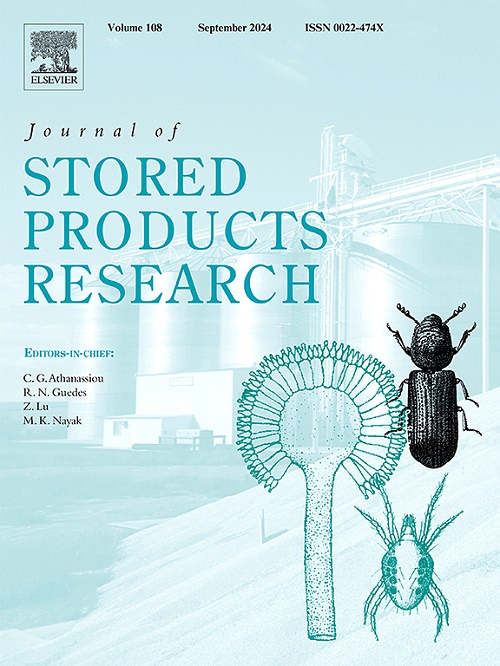Inhibition of DNA methylation delays softening in harvested kiwifruit by inhibiting ethylene biosynthesis to delay the degradation of starch and cell wall polysaccharides
IF 2.7
2区 农林科学
Q1 ENTOMOLOGY
引用次数: 0
Abstract
Fruit softening significantly impacts the economic and nutritional value of fruits during storage. This study investigated the role of the inhibition of DNA methylation in delaying softening in kiwifruit during postharvest storage. The treatment effectively inhibited firmness loss by suppressing ethylene production, reducing starch degradation, and preserving cell wall integrity. Ethylene biosynthesis was suppressed via downregulation of AcACO and AcACS genes, while decreased transcript levels of AcISA, AcBAM, and AcAMY inhibited starch hydrolysis. Furthermore, the inhibition of DNA methylation was found to reduce the expression of genes in connection with cell wall degradation, including AcPE, AcPG, AcPL, AcXTH, AcCEL, and AcEG, thereby maintaining higher levels of cell wall components such as cellulose, hemicellulose, and pectin. The treatment also altered methylation dynamics by enhancing demethylase activity and reducing methylase activity, suggesting an epigenetic regulation of ripening processes. These findings highlight the potential of the inhibition of DNA methylation in extending kiwifruit shelf life.
DNA甲基化抑制通过抑制乙烯生物合成延缓淀粉和细胞壁多糖降解延缓收获猕猴桃软化
果实软化对贮藏过程中果实的经济价值和营养价值有显著影响。本研究探讨了DNA甲基化抑制在延缓猕猴桃采后贮藏软化中的作用。该处理通过抑制乙烯生成、减少淀粉降解和保持细胞壁完整性有效地抑制了硬度损失。AcACO和AcACS基因的下调抑制了乙烯的生物合成,而AcISA、AcBAM和AcAMY转录物水平的降低抑制了淀粉的水解。此外,发现DNA甲基化抑制可以降低与细胞壁降解相关的基因的表达,包括AcPE、AcPG、AcPL、AcXTH、AcCEL和AcEG,从而维持较高水平的细胞壁成分,如纤维素、半纤维素和果胶。该处理还通过增强去甲基化酶活性和降低甲基化酶活性来改变甲基化动力学,表明成熟过程的表观遗传调控。这些发现强调了抑制DNA甲基化在延长猕猴桃保质期方面的潜力。
本文章由计算机程序翻译,如有差异,请以英文原文为准。
求助全文
约1分钟内获得全文
求助全文
来源期刊
CiteScore
5.70
自引率
18.50%
发文量
112
审稿时长
45 days
期刊介绍:
The Journal of Stored Products Research provides an international medium for the publication of both reviews and original results from laboratory and field studies on the preservation and safety of stored products, notably food stocks, covering storage-related problems from the producer through the supply chain to the consumer. Stored products are characterised by having relatively low moisture content and include raw and semi-processed foods, animal feedstuffs, and a range of other durable items, including materials such as clothing or museum artefacts.

 求助内容:
求助内容: 应助结果提醒方式:
应助结果提醒方式:


